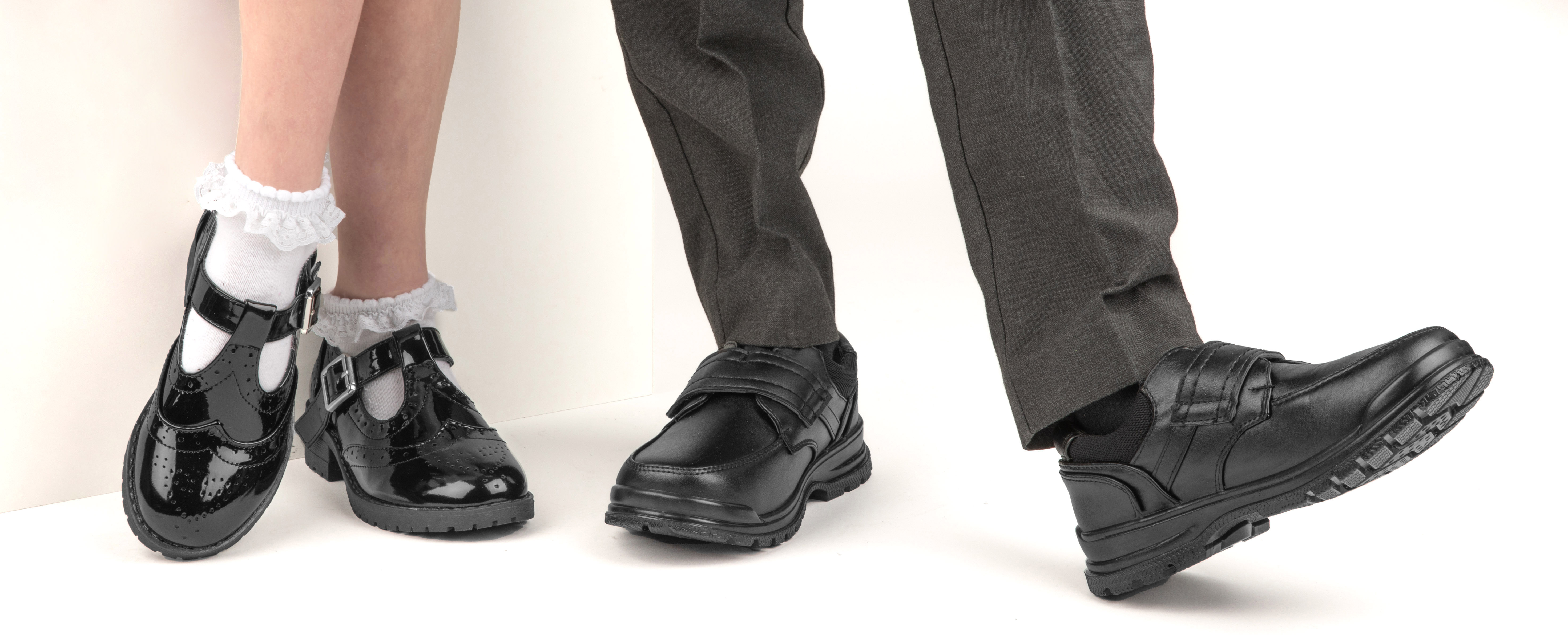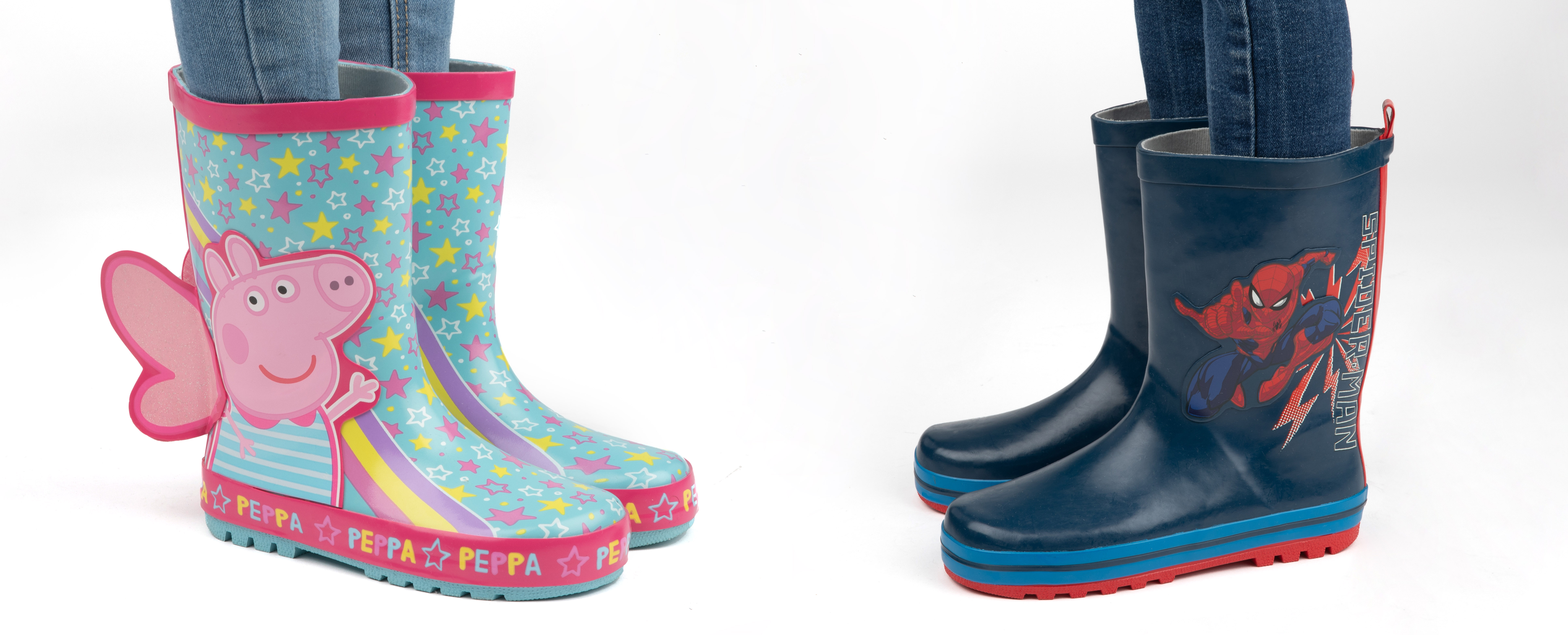The Ultimate Kids’ Shoe Size Chart and Fitting Guide
Choosing the perfect pair of shoes for your child’s growing feet can be tricky. Our handy kids’ shoe size chart and fitting guide will help you find the right match.

In this guide, you’ll discover:
What you’ll need
- A piece of paper
- A tape measure or ruler
- A pencil
- Sticky tape
- 1 - Stick the paper to the floor against a wall with your sticky tape.
- 2 - Place your child’s foot on top, pressing down gently so it’s flat and making sure toes aren’t curled.
- 3 - Draw a small line behind the heel and another in front of the longest toe. Measure the distance between the two for the length.
- 4 - You’re all set! Use our kids’ shoe size conversion chart to find the right size.
Measuring top tips:
Give feet some wriggle room
It’s a good idea to factor in some wriggle room by adding an extra finger-width of space when sizing up. If shoes are going to be worn with socks, make sure your child is wearing them whilst measuring feet.
Don’t forget the other foot!
It’s quite common to have one foot slightly larger than the other, so make sure you measure both. Use the measurement for the larger foot to find a shoe that fits.
Our kids’ shoe size chart
Take a look at our comprehensive kids’ shoe size chart below, which gives you both UK and European sizes. It also lets you switch between inches and centimetres.
| UK |
EU |
Heel to Toe Length (Inches) |
Heel to Toe Length (cm) |
| 4 |
20.5 |
5.78 |
14.7 |
| 5 |
21.5 |
6.06 |
15.4 |
| 6 |
23 |
6.33 |
16.1 |
| 7 |
24 |
6.61 |
16.8 |
| 8 |
25.5 |
6.88 |
17.5 |
| 9 |
27 |
7.16 |
18.2 |
| 10 |
28 |
7.44 |
18.9 |
| 11 |
29 |
7.71 |
19.6 |
| 12 |
30.5 |
7.99 |
20.3 |
| 13 |
32 |
8.26 |
21 |
| 1 |
33 |
8.54 |
21.7 |
| 2 |
34.5 |
8.81 |
22.4 |
| 3 |
35.5 |
9.2 |
23.1 |
| 4 |
37 |
9.4 |
23.9 |
| 5 |
38 |
9.72 |
24.7 |
| 6 |
39.5 |
10 |
25.4 |
Average children’s shoe sizes
Kids are unique in every way but, if you would like a rough idea of shoe sizes by age, then our average children’s shoe sizes guide gives you just that. Remember though, it’s important you still measure for an accurate shoe size.
| Age |
Size |
| Up to 1 |
3-4 |
| 2 |
5-6 |
| 3 |
7-8 |
| 4 |
9-10 |
| 5 |
10-11 |
| 6 |
11-12 |
| 7 |
12-13 |
| 8-9 |
1-2 |
| 10-11 |
3-4 |
Don’t be tempted to size up to avoid having to buy new shoes as your child grows. Shoes that are too large can become a trip hazard or can make them struggle to walk.
Width Fittings
There are four standard widths for children’s shoe sizes in the UK. These are:
| Width |
Fitting |
| D-E |
Narrow Fit |
| F |
Standard Fit |
| G |
Wide Fit |
| H |
Extra Wide Fit |
Trying to squeeze into shoes that are the wrong width can leave feet sore. Take the above fittings into consideration as well as how shallow or deep the arch of your child’s foot is and how wide or narrow they are.
We don’t use width fittings at shoezone – however, it’s still useful to have an idea as to how wide feet are. You want to make sure shoes fit perfectly and provide maximum support.
Heel Sizes
In toddlers, as close to barefoot is best when it comes to the heel height of shoes. Below is a quick guide to children’s heel heights:
| Heel Type |
Height |
| Flat |
Up to 0.5cm |
| Low |
0.5 to 2cm |
| Medium |
2 to 3cm |
| High |
3 to 4cm |

How to pick the perfect pair
Once you’ve got your sizes sorted, it’s time to find the perfect pair of boys' school shoes or girls' school shoes.
Shop our full range of kids’ footwear below, including Kickers school shoes, kids' wellies, and kids' sandals. Browse through our selection of kids' trainers, boots, and more to find the perfect fit for your child.
Shoe fitting top tips
Check the top of the shoe
There should be a slight ripple movement when you rub your thumb over the top of the shoes. If the shoe doesn’t move, it could be too tight or too narrow.
Ask your child to walk in the shoes
Your child should be able to walk easily and naturally without struggling. Check that the heel doesn’t slip and that there’s no excessive gapping at the side.
Your questions answered
What are children’s shoe sizes in the UK?
Children’s shoe sizes in the UK start at 0, which is usually a good size for newborn babies. They then go up to size 13, which is the end of the ‘little kids’ sizes. After that, in bigger kids’ sizes, they go from size 1 to 6.
What size shoe is a 4-year-old?
The average size for a 4-year-old is usually around a UK 9 or 10. Every child is different and grows at different rates, so don’t worry if feet are slightly bigger or smaller than the average size. If you want to find out average sizes for your child based on age, take a look at our average children’s shoe sizes chart.
Is size 13 and 1 the same?
No, size 13 and size 1 are not the same. Size 13 is classed as a little kids’ size, while size 1 is the next step up – or the first ‘big kids’’ size. These bigger sizes then go up to a size 6.